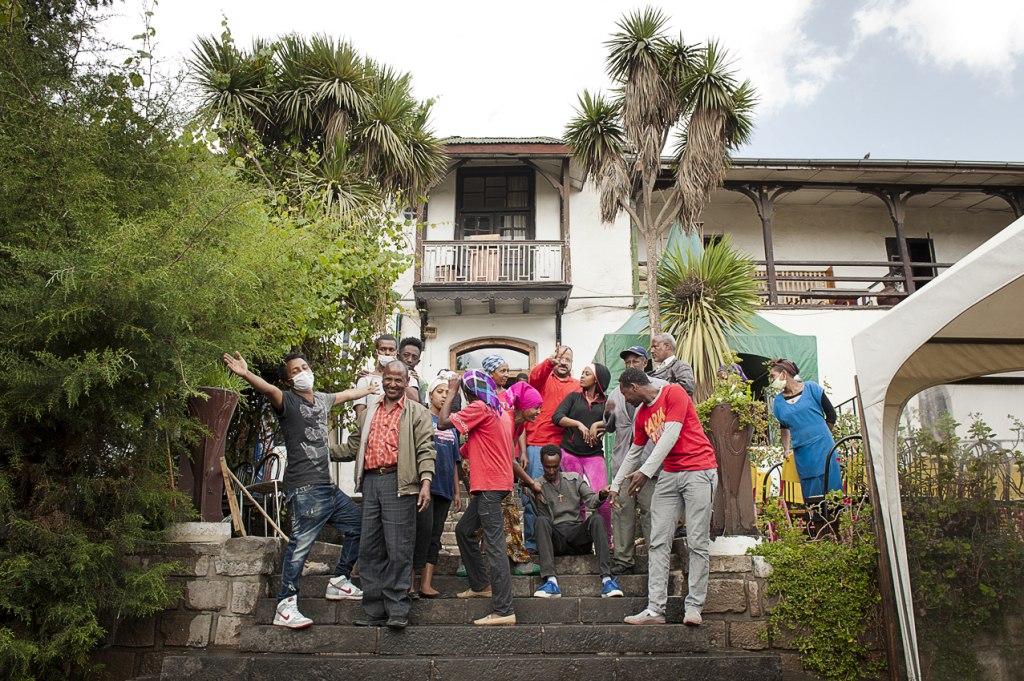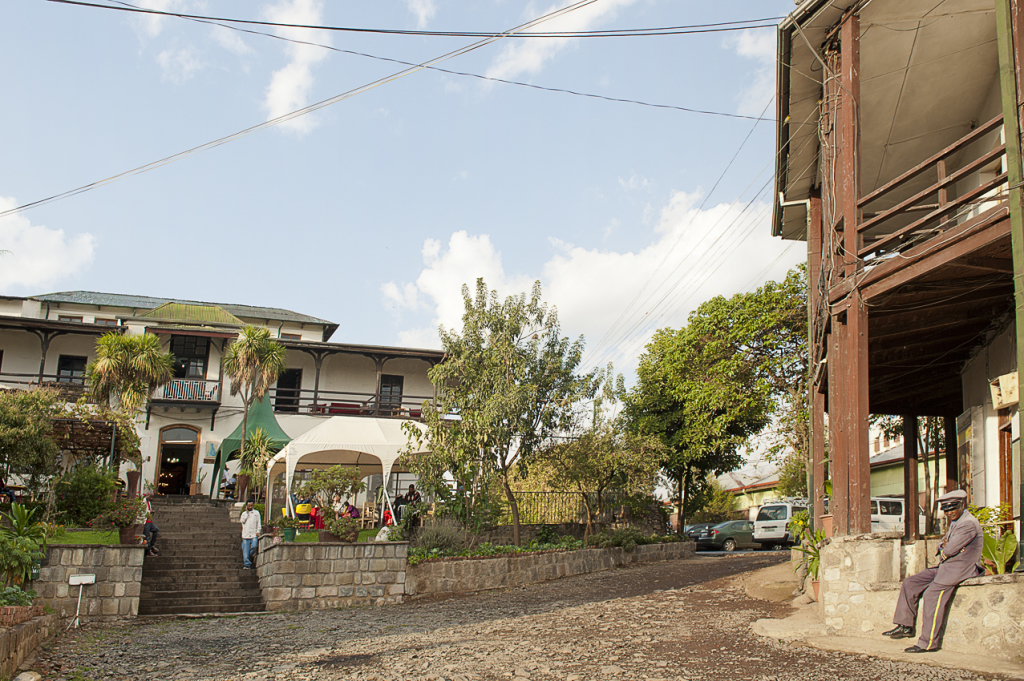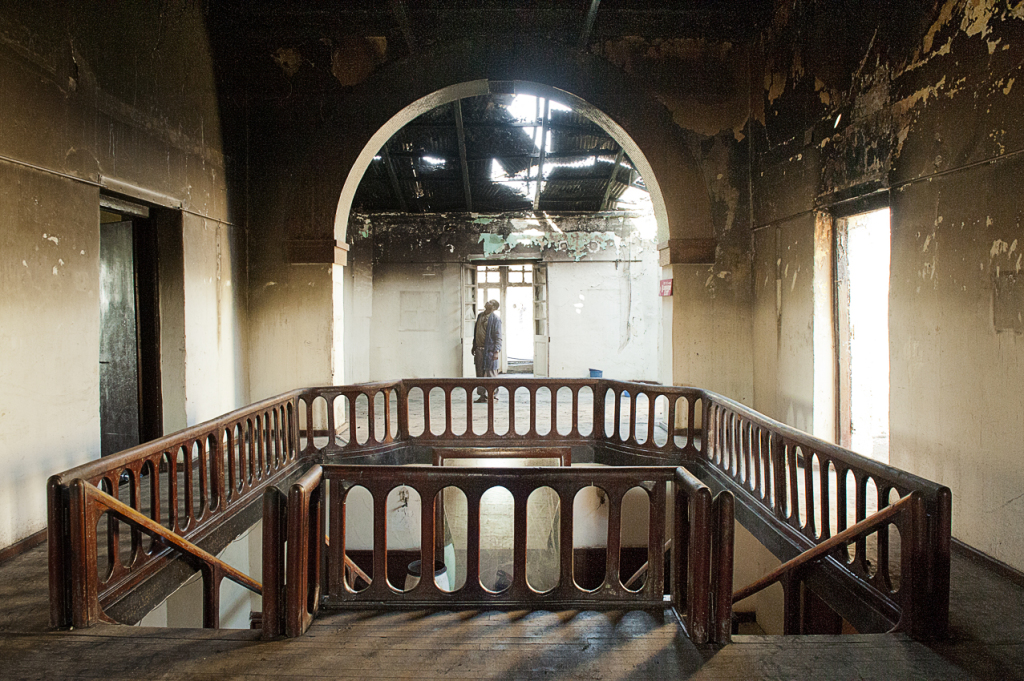 On the morning of Sunday January 11 a fire of unknown origin has destroyed part of the most ancient hotel in Ethiopia – the Itegue Taitu Hotel – making away with Jazzamba, the historic ethio-jazz club. Among the landmarks in Addis Ababa’s architectural and cultural heritage, these places are especially dear to me because here started my discovery of Ethiopia. It is in an infinitely sad state of mind that I am writing following note, in the auspice that these places will soon be back to their original splendour.
On the morning of Sunday January 11 a fire of unknown origin has destroyed part of the most ancient hotel in Ethiopia – the Itegue Taitu Hotel – making away with Jazzamba, the historic ethio-jazz club. Among the landmarks in Addis Ababa’s architectural and cultural heritage, these places are especially dear to me because here started my discovery of Ethiopia. It is in an infinitely sad state of mind that I am writing following note, in the auspice that these places will soon be back to their original splendour.
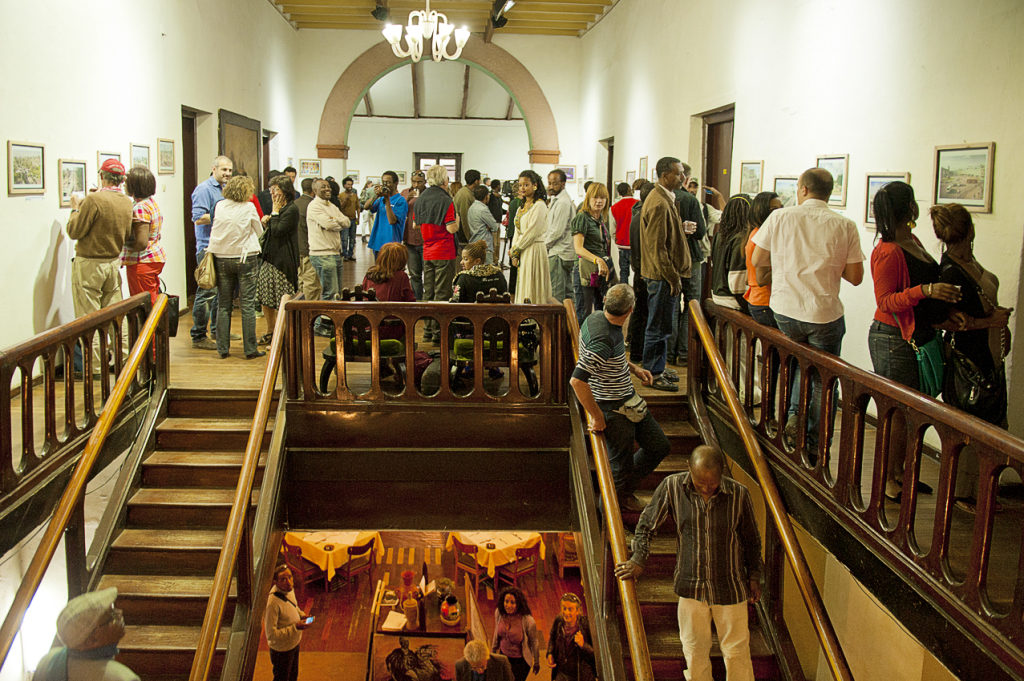 The cat’s nails don’t stop rasping the sofa where I have laid my sleeping bag. No one else is in the large hall where I am going to spend my first night in Addis Ababa. But still I feel presences here. A feeble yellow light peering through the wide French window lightens an oil picture in front of me. Emperor Menelik II, full size portrayed in its wild military uniform, points a severe inquiring look upon me. After a short run from the airport along the City’s silent and dark streets a taxi has dropped me off here at 3 am. A dozy young girl at the reception desk has informed me desolately that the room I had booked from Italy has been given away to another customer. So for the moment I can stay in the main hall of the historic hotel. But despite of the comfortable accommodation I can’t fall asleep. Perhaps I already perceive all of the glorious past of this magic place, which soon will become to me home, office, gallery.
The cat’s nails don’t stop rasping the sofa where I have laid my sleeping bag. No one else is in the large hall where I am going to spend my first night in Addis Ababa. But still I feel presences here. A feeble yellow light peering through the wide French window lightens an oil picture in front of me. Emperor Menelik II, full size portrayed in its wild military uniform, points a severe inquiring look upon me. After a short run from the airport along the City’s silent and dark streets a taxi has dropped me off here at 3 am. A dozy young girl at the reception desk has informed me desolately that the room I had booked from Italy has been given away to another customer. So for the moment I can stay in the main hall of the historic hotel. But despite of the comfortable accommodation I can’t fall asleep. Perhaps I already perceive all of the glorious past of this magic place, which soon will become to me home, office, gallery.
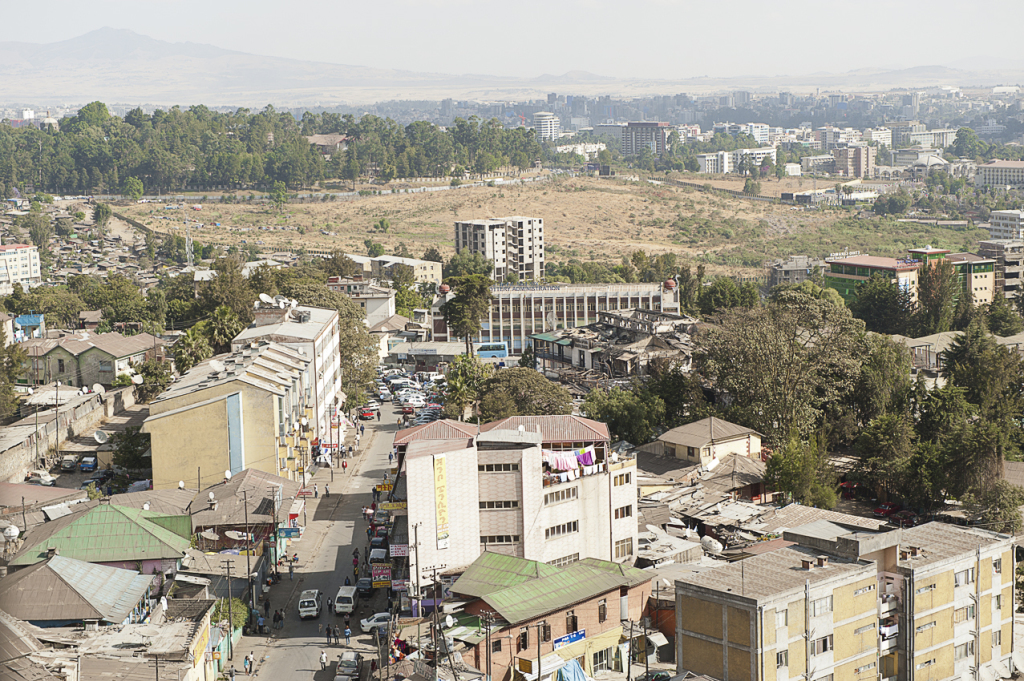 Meant to lodge the prestigious visitors of the City that Queen Itegue Taitu and her husband Menelik II had founded, the Itegue Taitu Hotel – of which the Queen was as well first administrator – is not only Ethiopia’s oldest hotel (it was completed in 1907 on Armenian architect Minas Kherbekian’s project). It is the trait d’union between local people and foreign visitors. “You people who come from overseas here you will be given lodging and food to meet your customs” announced the billboard the Queen had hung at the entrance. In today’s reception, beside Itegue Taitu’s portrait in her regal vestment, a more modest tablet informs foreign customers that “no price discrimination is applied, our fares are equal for all hotel guests”.
Meant to lodge the prestigious visitors of the City that Queen Itegue Taitu and her husband Menelik II had founded, the Itegue Taitu Hotel – of which the Queen was as well first administrator – is not only Ethiopia’s oldest hotel (it was completed in 1907 on Armenian architect Minas Kherbekian’s project). It is the trait d’union between local people and foreign visitors. “You people who come from overseas here you will be given lodging and food to meet your customs” announced the billboard the Queen had hung at the entrance. In today’s reception, beside Itegue Taitu’s portrait in her regal vestment, a more modest tablet informs foreign customers that “no price discrimination is applied, our fares are equal for all hotel guests”.
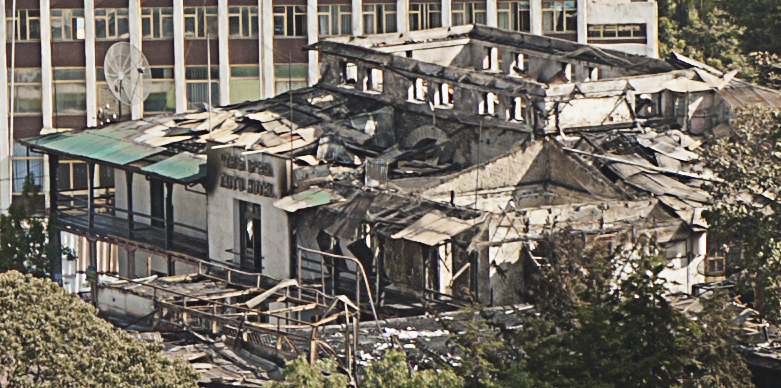 An extraordinary mankind parades around every day on the hotel’s terrace: German writers on the brink of a nervous breakdown, exorcisms passionate south Italian anthropologists, gargantuan Armenian film makers in search of roots, African diplomats too honest to stay at Sheraton’s, Dutch coffee-shop owners who need to brighten up their minds, circus managers, gold diggers, silent government spies, pretty young women hunting for a one-way air ticket to a Western country. To many of these characters the open-air café tables are the ideal place where to deal with their business and weigh the City’s external temperature from the wicker canopy’s fresh shelter.
An extraordinary mankind parades around every day on the hotel’s terrace: German writers on the brink of a nervous breakdown, exorcisms passionate south Italian anthropologists, gargantuan Armenian film makers in search of roots, African diplomats too honest to stay at Sheraton’s, Dutch coffee-shop owners who need to brighten up their minds, circus managers, gold diggers, silent government spies, pretty young women hunting for a one-way air ticket to a Western country. To many of these characters the open-air café tables are the ideal place where to deal with their business and weigh the City’s external temperature from the wicker canopy’s fresh shelter.
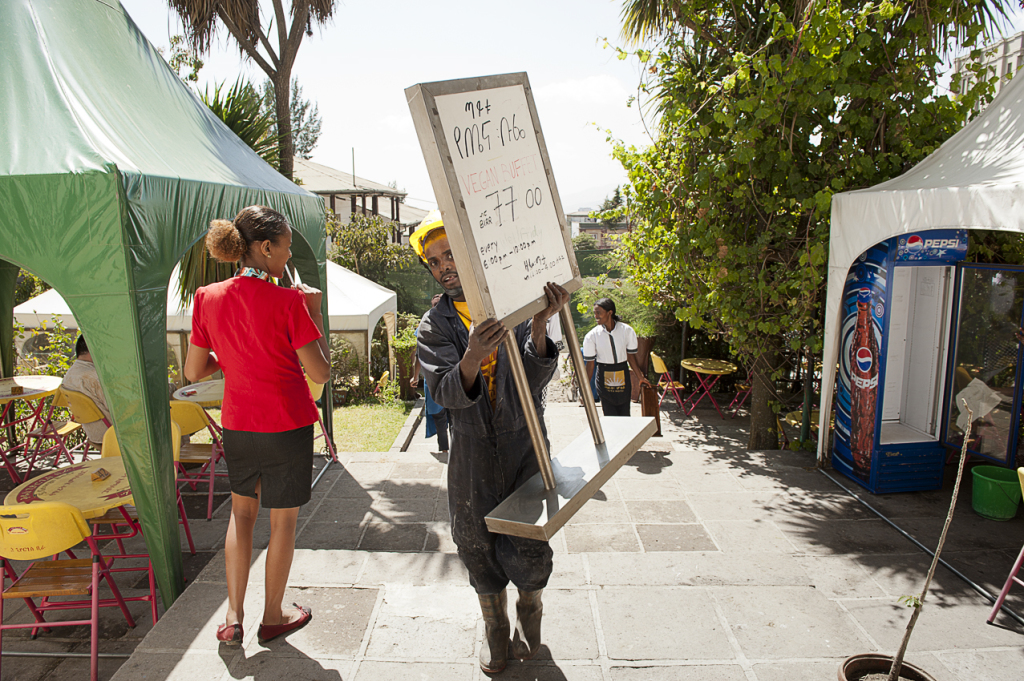 All around the terrace, in the flower beds peep out broccolis, cauliflowers, lettuce, beans, tomatoes. A “gardener” from Zimbabwe has converted the hotel’s green areas into vegetable gardens. A reality that has become part in the Slow Food “Thousand Gardens” project. Small room has been indeed left for flowers, but an excellent cheap “zero-kilometer” vegan lunch buffet is available daily at the hotel.
All around the terrace, in the flower beds peep out broccolis, cauliflowers, lettuce, beans, tomatoes. A “gardener” from Zimbabwe has converted the hotel’s green areas into vegetable gardens. A reality that has become part in the Slow Food “Thousand Gardens” project. Small room has been indeed left for flowers, but an excellent cheap “zero-kilometer” vegan lunch buffet is available daily at the hotel.
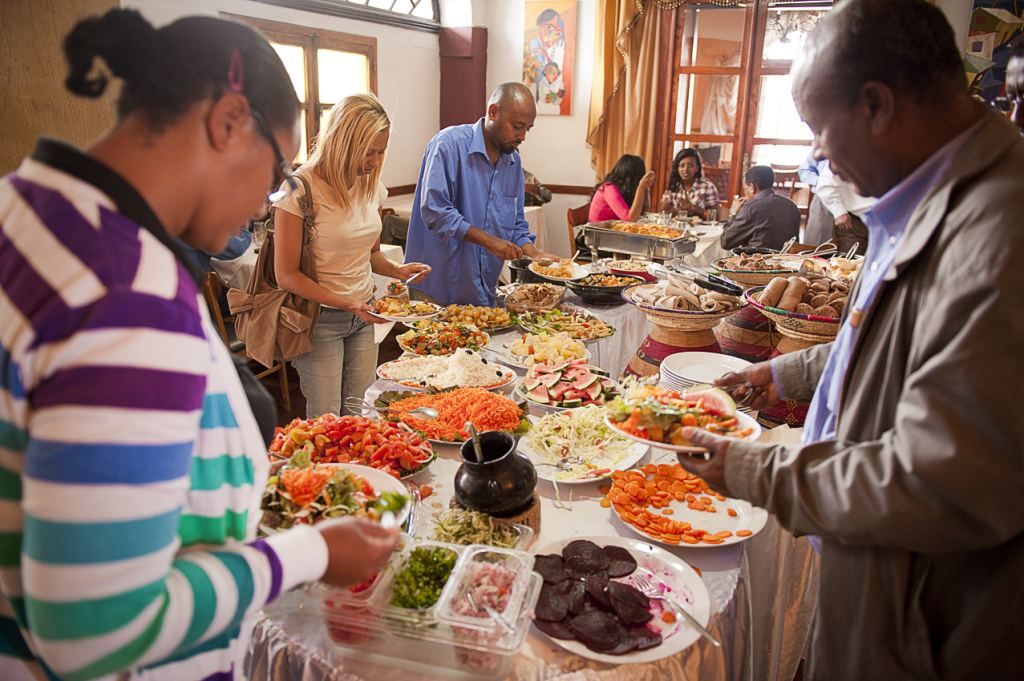 The Taitu Hotel hosts one of the local music Pantheons. Part and parcel of the historical building, Jazzamba is the stage on which the best ethio-jazz talents and world-music rising stars perform: among the others Alemayeo Eshete, the Addis Acoustic Project, Samuel Yirga, Girma Negash. Old Ethiopian music lions and young global musicians perform side by side to find a synthesis of modernity and tradition through soul, rhytmn’blues and folk music. The Addis Ababa Social Club.
The Taitu Hotel hosts one of the local music Pantheons. Part and parcel of the historical building, Jazzamba is the stage on which the best ethio-jazz talents and world-music rising stars perform: among the others Alemayeo Eshete, the Addis Acoustic Project, Samuel Yirga, Girma Negash. Old Ethiopian music lions and young global musicians perform side by side to find a synthesis of modernity and tradition through soul, rhytmn’blues and folk music. The Addis Ababa Social Club.
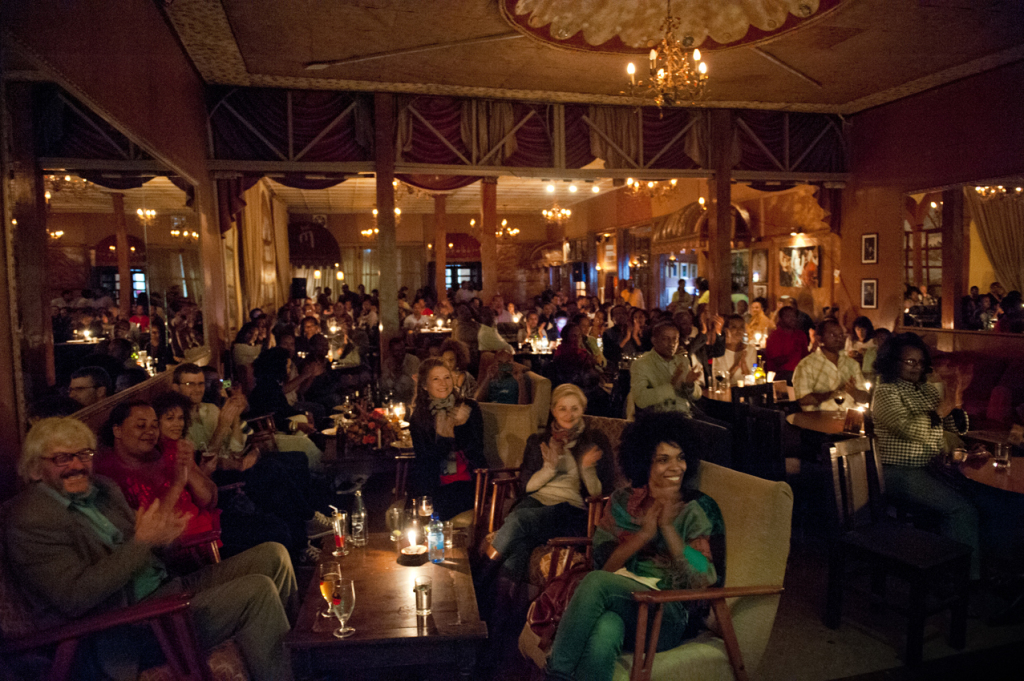 Although less eye-catching than the graceless monolith known as “Arada building”, Taitu Hotel is the landmark which best represents Arada, the social life and economic city’s beating heart. The hotel compound is a permanent gravity center for tens of young people keen to guiding tourists through the major City’s attractions and helping meet their needs. Just across the main entrance the never ending drama of Addis’s life is on play, with no intermission nor filter. Lepers wound in their putrid bandages dragging themselves along the street, begging drunken cripples, dogs and children sharing restaurants’ remains and dust, adolescent whores selling their bodies in front of the local police station. Living at Taitu’s means getting in touch with all these people, listening to their yammers and pleas, meeting their glances, brushing against their bodies violated by misery. Those who really have an interest in getting acquainted with this City won’t find any better place where to move from.
Although less eye-catching than the graceless monolith known as “Arada building”, Taitu Hotel is the landmark which best represents Arada, the social life and economic city’s beating heart. The hotel compound is a permanent gravity center for tens of young people keen to guiding tourists through the major City’s attractions and helping meet their needs. Just across the main entrance the never ending drama of Addis’s life is on play, with no intermission nor filter. Lepers wound in their putrid bandages dragging themselves along the street, begging drunken cripples, dogs and children sharing restaurants’ remains and dust, adolescent whores selling their bodies in front of the local police station. Living at Taitu’s means getting in touch with all these people, listening to their yammers and pleas, meeting their glances, brushing against their bodies violated by misery. Those who really have an interest in getting acquainted with this City won’t find any better place where to move from.
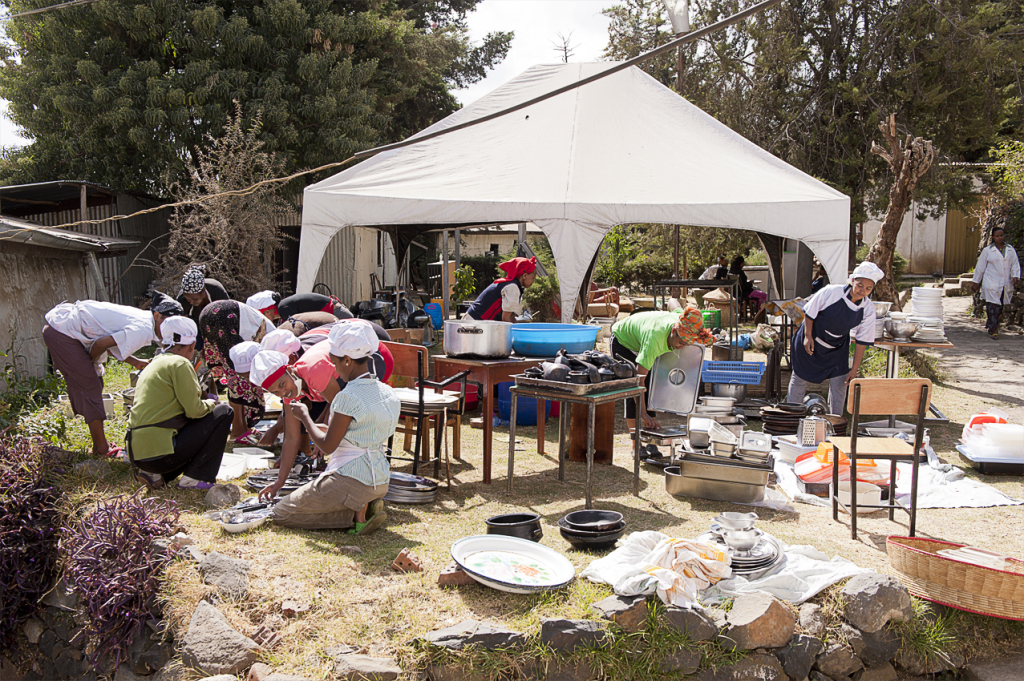 For many travelers, like myself, Taitu has been home and family away from one’s own home and family. The hotel staff often adopt long-time guests and take care of them affectionately. I know persons who fallen ill have been assisted by room service personnel with no less attention than their own relatives would have paid. For most hotel personnel, the hotel not only is their workplace but the place where they live. Last Sunday’s fire putted them in trouble. They all deserve support and help, as attention and engagement by all the people who love this City deserves the reconstruction of one of Addis Ababa’s most important laical temples.
For many travelers, like myself, Taitu has been home and family away from one’s own home and family. The hotel staff often adopt long-time guests and take care of them affectionately. I know persons who fallen ill have been assisted by room service personnel with no less attention than their own relatives would have paid. For most hotel personnel, the hotel not only is their workplace but the place where they live. Last Sunday’s fire putted them in trouble. They all deserve support and help, as attention and engagement by all the people who love this City deserves the reconstruction of one of Addis Ababa’s most important laical temples.
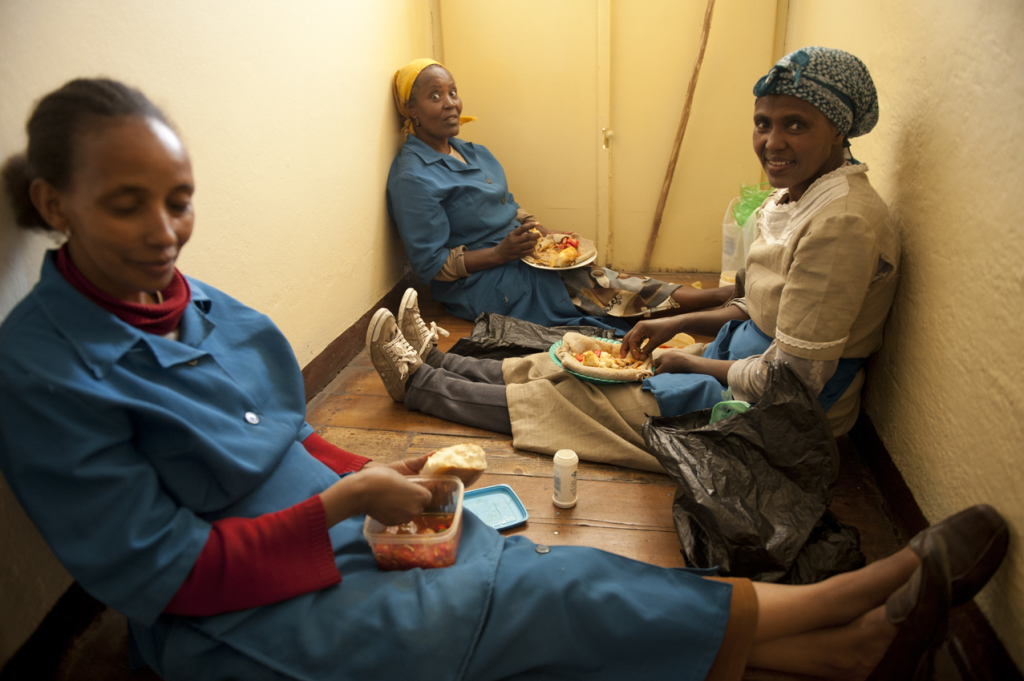 Places like Itegue Taitu Hotel are as meaningful for Addis’ future as “Babur”, the light train which is to be inaugurated shortly. Willpower to taking care of their City’s historic past should conform to Addis’s people enthusiastic expectations towards modernity. Defending the most ancient Ethiopia’s hotel and expecting from government the utmost engagement in promoting a prompt and effective reconstruction of the building, means making sure that the Old City’s heart will keep on beating in the “new Africa’s New York”. The action that in the coming months will be taken to mend damages occurred to the landmark which by Lonely Planet is defined “a museum piece full of beautiful old furniture and high ceilings” will be a test bed. Besides being strongly engaged in putting up a skyline worth of the global capital city that Addis is rapidly turning into, is the City’s administration also keen to safeguarding its historical heritage?
Places like Itegue Taitu Hotel are as meaningful for Addis’ future as “Babur”, the light train which is to be inaugurated shortly. Willpower to taking care of their City’s historic past should conform to Addis’s people enthusiastic expectations towards modernity. Defending the most ancient Ethiopia’s hotel and expecting from government the utmost engagement in promoting a prompt and effective reconstruction of the building, means making sure that the Old City’s heart will keep on beating in the “new Africa’s New York”. The action that in the coming months will be taken to mend damages occurred to the landmark which by Lonely Planet is defined “a museum piece full of beautiful old furniture and high ceilings” will be a test bed. Besides being strongly engaged in putting up a skyline worth of the global capital city that Addis is rapidly turning into, is the City’s administration also keen to safeguarding its historical heritage?
La mattina di domenica 11 gennaio un incendio, le cui cause non sono ancora state chiarite, ha divorato parte del più antico albergo dell’Etiopia, l’Itegue Taitu Hotel, e cancellato il Jazzamba, storico club dell’ethio-jazz. Tra gli edifici più importanti del patrimonio architettonico e culturale di Addis Abeba, questi luoghi sono stati anche il teatro dove ho mosso i primi passi alla scoperta dell’Etiopia. Scrivo la nota che segue con “infinita tristeza”, ma soprattutto con la speranza di vederli tornare a splendere il più presto possibile.
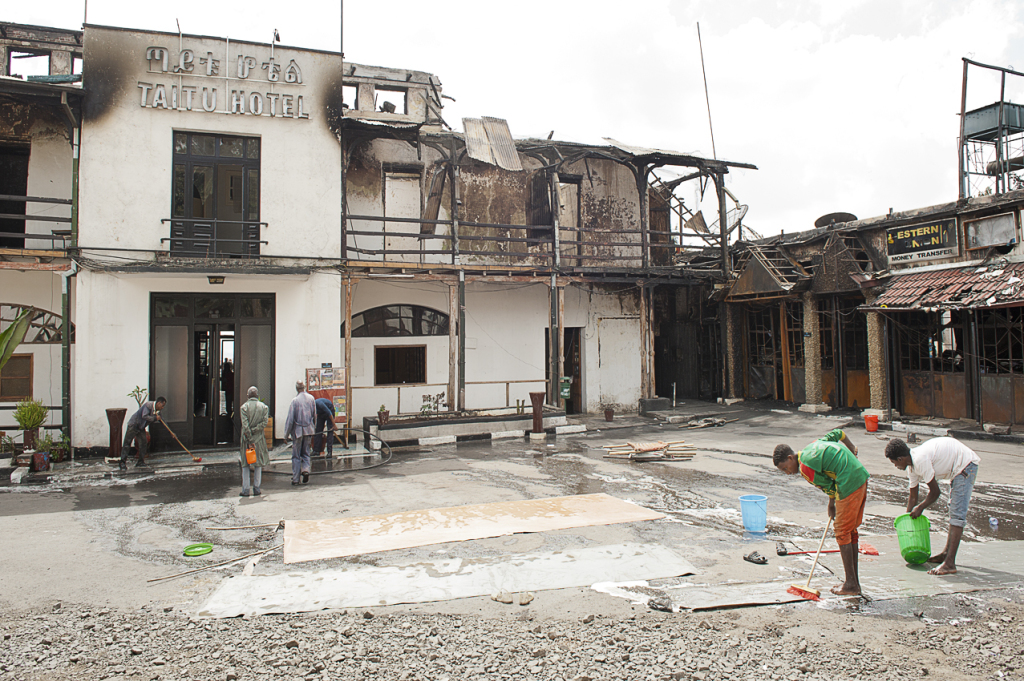 Le unghie del gatto non smettono di torturare il sofà su cui ho sistemato il sacco a pelo. A parte l’animale nella grande sala che mi ospita per la notte non c’è anima viva. L’atmosfera però è affollata di presenze. Un fioco raggio di luce gialla attraversa la grande porta-finestra della sala per posarsi sul dipinto a olio di fronte a me. Raffigurato a grandezza naturale in selvaggia tenuta militare, l’imperatore Menelik II mi punta addosso uno sguardo severo. Sembra quasi voler chiedere conto del mio imbarazzo. È la prima notte che passo in Etiopia. Il taxi che dall’aeroporto ha attraversato le strade buie e deserte della città mi ha depositato qui alle 3 del mattino. Sdraiata dietro al bancone della reception ho trovato una ragazza sonnecchiante, che mi ha annunciato sconsolata di aver già dato a qualcun altro la stanza riservata dall’Italia. In compenso fin quando l’inconveniente non sarà risolto sono autorizzato a sistemarmi nella sala principale di questo storico albergo. Il giaciglio è confortevole ma non riesco proprio a prender sonno. Quasi potessi già avvertire quanto vissuto mi attende tra le mura di questo edificio magico, che presto diverrà per me casa, ufficio, galleria.
Le unghie del gatto non smettono di torturare il sofà su cui ho sistemato il sacco a pelo. A parte l’animale nella grande sala che mi ospita per la notte non c’è anima viva. L’atmosfera però è affollata di presenze. Un fioco raggio di luce gialla attraversa la grande porta-finestra della sala per posarsi sul dipinto a olio di fronte a me. Raffigurato a grandezza naturale in selvaggia tenuta militare, l’imperatore Menelik II mi punta addosso uno sguardo severo. Sembra quasi voler chiedere conto del mio imbarazzo. È la prima notte che passo in Etiopia. Il taxi che dall’aeroporto ha attraversato le strade buie e deserte della città mi ha depositato qui alle 3 del mattino. Sdraiata dietro al bancone della reception ho trovato una ragazza sonnecchiante, che mi ha annunciato sconsolata di aver già dato a qualcun altro la stanza riservata dall’Italia. In compenso fin quando l’inconveniente non sarà risolto sono autorizzato a sistemarmi nella sala principale di questo storico albergo. Il giaciglio è confortevole ma non riesco proprio a prender sonno. Quasi potessi già avvertire quanto vissuto mi attende tra le mura di questo edificio magico, che presto diverrà per me casa, ufficio, galleria.
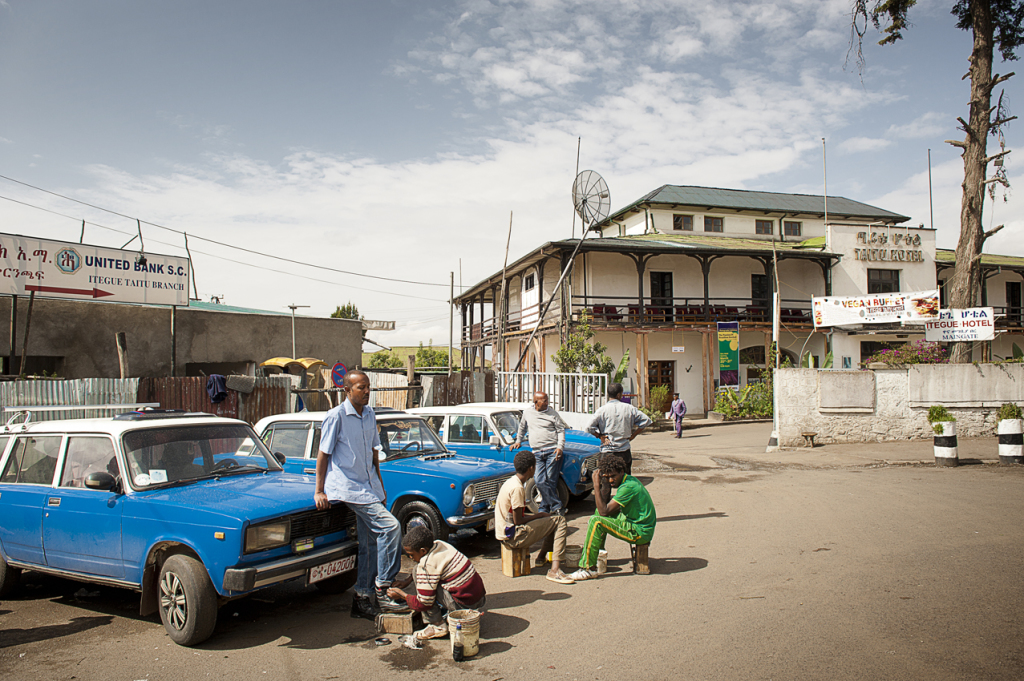 Voluto e al principio amministrato dalla regina Itegue Taitu per accogliere gli illustri ospiti della città appena fondata con il marito Menelik II, il Taitu Hotel non è soltanto l’albergo più antico di tutta l’Etiopia (venne terminato nel 1907 su progetto dell’architetto armeno Minas Kherbekian). Questo edificio è soprattutto il trait d’union tra la popolazione locale e gli stranieri che visitano il Paese. “Genti che venite dal mare, qui potrete dormire e mangiare secondo i vostri costumi”, recitava il cartello fatto affiggere all’ingresso dalla regina. Nell’odierna reception, accanto al dipinto che ritrae Itegue Taitu in abiti regali, c’è una targa più modesta che assicura i clienti stranieri: “non facciamo discriminazioni di prezzo, le nostre tariffe sono uguali per tutti”.
Voluto e al principio amministrato dalla regina Itegue Taitu per accogliere gli illustri ospiti della città appena fondata con il marito Menelik II, il Taitu Hotel non è soltanto l’albergo più antico di tutta l’Etiopia (venne terminato nel 1907 su progetto dell’architetto armeno Minas Kherbekian). Questo edificio è soprattutto il trait d’union tra la popolazione locale e gli stranieri che visitano il Paese. “Genti che venite dal mare, qui potrete dormire e mangiare secondo i vostri costumi”, recitava il cartello fatto affiggere all’ingresso dalla regina. Nell’odierna reception, accanto al dipinto che ritrae Itegue Taitu in abiti regali, c’è una targa più modesta che assicura i clienti stranieri: “non facciamo discriminazioni di prezzo, le nostre tariffe sono uguali per tutti”.
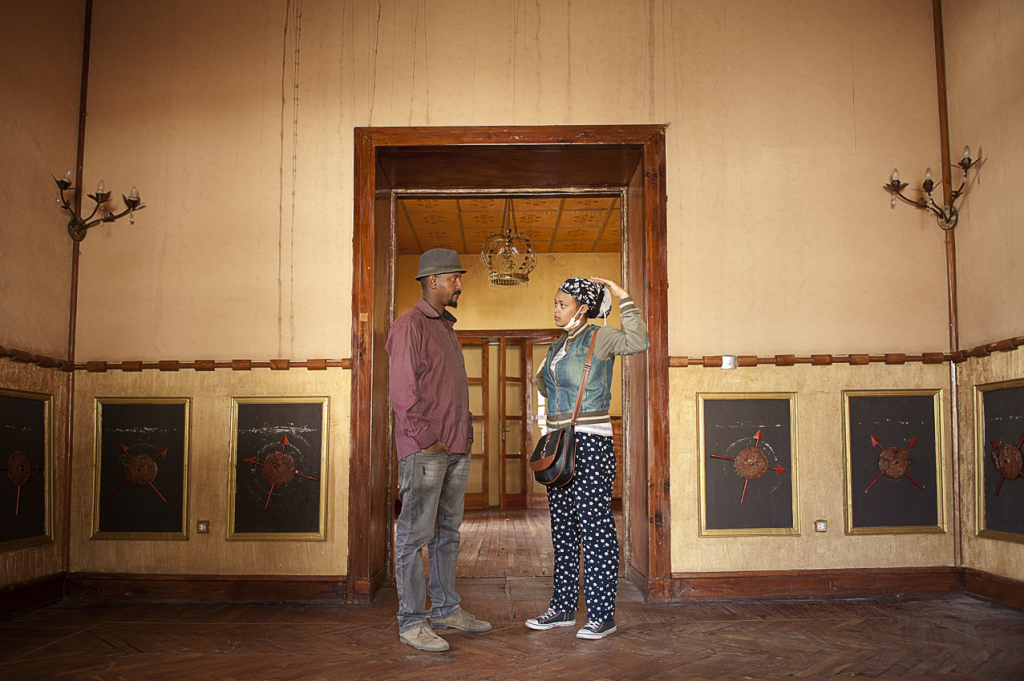 Sulla terrazza dell’albergo ogni giorno si esibisce un’umanità straordinaria: scrittori tedeschi sull’orlo di una crisi di nervi, antropologi calabresi fanatici d’esorcismi, mastodontici film-maker armeni in cerca di radici, diplomatici africani troppo onesti per alloggiare allo Sheraton, proprietari di coffee-shop olandesi venuti a schiarirsi le idee, direttrici di circo, cercatori d’oro, vecchi puttanieri, silenziose spie governative, graziose giovani in cerca di un biglietto di sola andata per l’Occidente. Per molti di questi personaggi, i tavolini del caffè all’aperto sono la sede ideale per sbrigare i propri affari, misurare la temperatura esterna della città al fresco riparo della tettoia di vimini.
Sulla terrazza dell’albergo ogni giorno si esibisce un’umanità straordinaria: scrittori tedeschi sull’orlo di una crisi di nervi, antropologi calabresi fanatici d’esorcismi, mastodontici film-maker armeni in cerca di radici, diplomatici africani troppo onesti per alloggiare allo Sheraton, proprietari di coffee-shop olandesi venuti a schiarirsi le idee, direttrici di circo, cercatori d’oro, vecchi puttanieri, silenziose spie governative, graziose giovani in cerca di un biglietto di sola andata per l’Occidente. Per molti di questi personaggi, i tavolini del caffè all’aperto sono la sede ideale per sbrigare i propri affari, misurare la temperatura esterna della città al fresco riparo della tettoia di vimini.
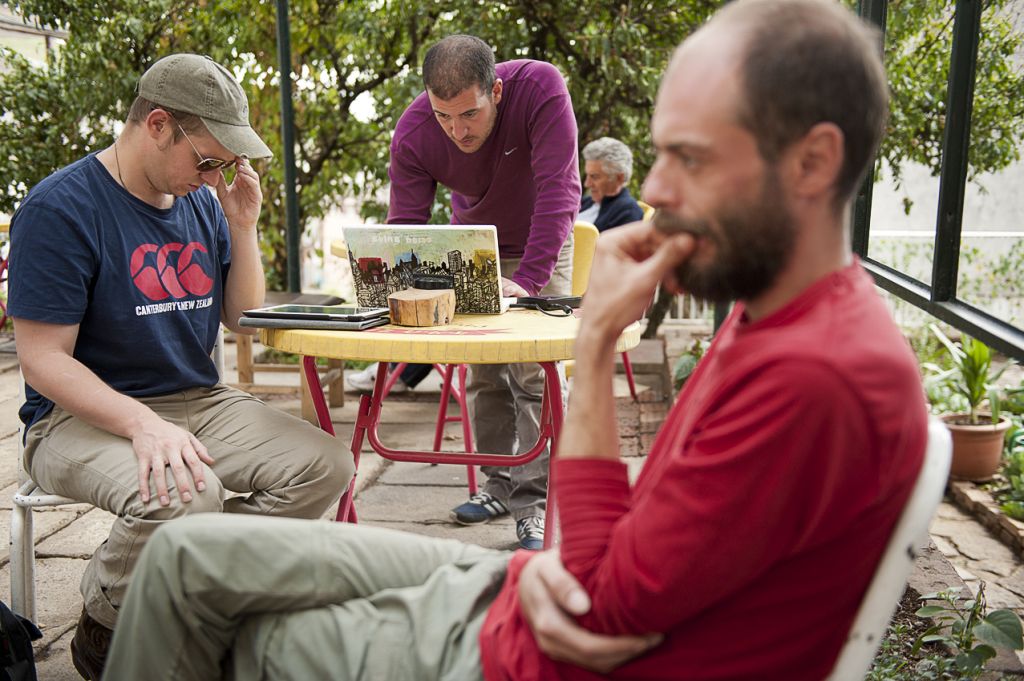 Intorno alla terrazza, dalle aiuole disseminate in ogni angolo del compound, spuntano broccoli, cavoli, lattuga, fagioli, pomodori. Sono gli orti in cui un “giardiniere” venuto dallo Zimbabwe e appassionato di permacultura ha convertito gli spazi verdi dell’albergo. Una realtà entrata anche nel progetto “Thousand Gardens” di Slow Food. Di spazio per i fiori ne è rimasto poco, ma in compenso ogni giorno a pranzo l’albergo offre un ottimo ed economico buffet vegano a “chilometri zero”.
Intorno alla terrazza, dalle aiuole disseminate in ogni angolo del compound, spuntano broccoli, cavoli, lattuga, fagioli, pomodori. Sono gli orti in cui un “giardiniere” venuto dallo Zimbabwe e appassionato di permacultura ha convertito gli spazi verdi dell’albergo. Una realtà entrata anche nel progetto “Thousand Gardens” di Slow Food. Di spazio per i fiori ne è rimasto poco, ma in compenso ogni giorno a pranzo l’albergo offre un ottimo ed economico buffet vegano a “chilometri zero”.
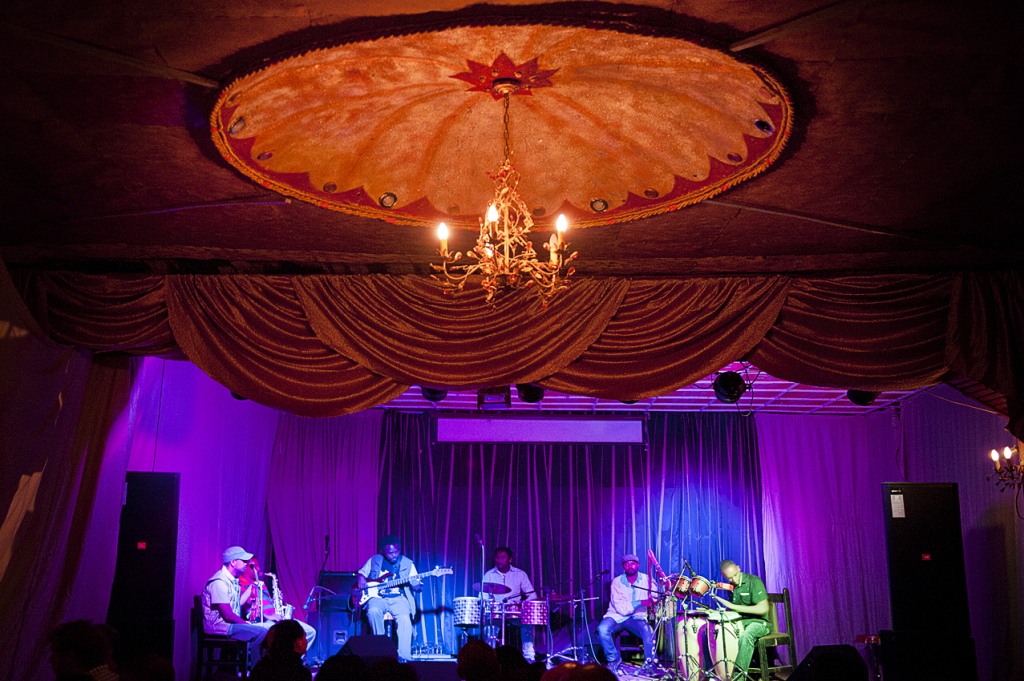 Il Taitu è anche sede di uno dei tempi della musica locale. Parte integrante dell’edificio storico, il Jazzamba è il palcoscenico su cui si esibiscono i maggiori talenti dell’ethio-jazz e le stelle nascenti della world-music: tra gli altri Alemayeo Eshete, l’Addis Acoustic Project, Samuel Yirga, Girma Negash. Vecchi leoni della musica etiopica e giovani musicisti globali suonano fianco a fianco per trovare una sintesi tra modernità e tradizioni a colpi di soul, rhytmn’blues e folk. L’Addis Abeba Social Club.
Il Taitu è anche sede di uno dei tempi della musica locale. Parte integrante dell’edificio storico, il Jazzamba è il palcoscenico su cui si esibiscono i maggiori talenti dell’ethio-jazz e le stelle nascenti della world-music: tra gli altri Alemayeo Eshete, l’Addis Acoustic Project, Samuel Yirga, Girma Negash. Vecchi leoni della musica etiopica e giovani musicisti globali suonano fianco a fianco per trovare una sintesi tra modernità e tradizioni a colpi di soul, rhytmn’blues e folk. L’Addis Abeba Social Club.
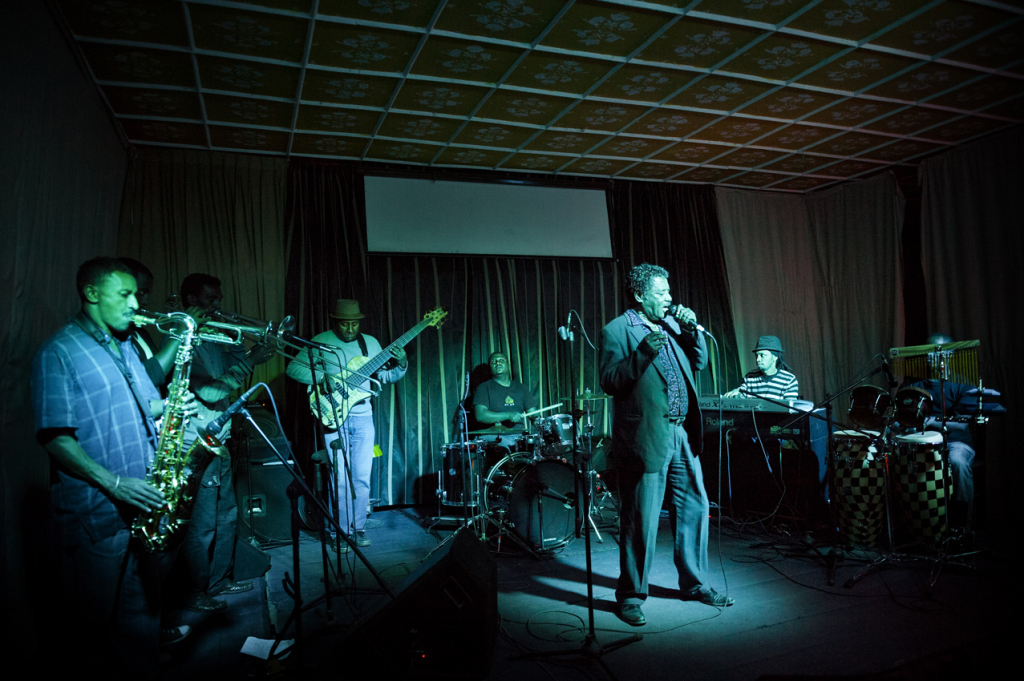 Meno appariscente dello sgraziato monolite conosciuto come “Arada building”, il Taitu Hotel è il palazzo storico che più rappresenta Arada, l’area da sempre cuore della vita sociale ed economica della città. Il compound dell’albergo è un centro di gravità permanente per decine di volenterosi giovani locali, pronti a guidare i turisti attraverso le principali attrattive della città o ad aiutarli a procurarsi tutto ciò di cui hanno bisogno. Appena fuori dall’ingresso principale va in scena senza sosta né filtro il dramma quotidiano dell’esistenza abebina. Lebbrosi che si trascinano lungo la via avvolti nelle loro bende putride, mendicanti storpi e ubriachi, mute di cani e bambini che condividono gli avanzi dei ristoranti e la polvere della strada, lustrascarpe affamati, schiere di puttane adolescenti che vendono il proprio corpo davanti agli uffici del commissariato locale di polizia. Vivere al Taitu significa entrare in contatto con tutti loro, ascoltarne i lamenti e le suppliche, incrociarne gli sguardi, sfiorarne i corpi violentati dalla miseria ladra. Chi fosse davvero interessato a conoscere questa città non troverà luogo migliore da cui muovere i primi passi.
Meno appariscente dello sgraziato monolite conosciuto come “Arada building”, il Taitu Hotel è il palazzo storico che più rappresenta Arada, l’area da sempre cuore della vita sociale ed economica della città. Il compound dell’albergo è un centro di gravità permanente per decine di volenterosi giovani locali, pronti a guidare i turisti attraverso le principali attrattive della città o ad aiutarli a procurarsi tutto ciò di cui hanno bisogno. Appena fuori dall’ingresso principale va in scena senza sosta né filtro il dramma quotidiano dell’esistenza abebina. Lebbrosi che si trascinano lungo la via avvolti nelle loro bende putride, mendicanti storpi e ubriachi, mute di cani e bambini che condividono gli avanzi dei ristoranti e la polvere della strada, lustrascarpe affamati, schiere di puttane adolescenti che vendono il proprio corpo davanti agli uffici del commissariato locale di polizia. Vivere al Taitu significa entrare in contatto con tutti loro, ascoltarne i lamenti e le suppliche, incrociarne gli sguardi, sfiorarne i corpi violentati dalla miseria ladra. Chi fosse davvero interessato a conoscere questa città non troverà luogo migliore da cui muovere i primi passi.
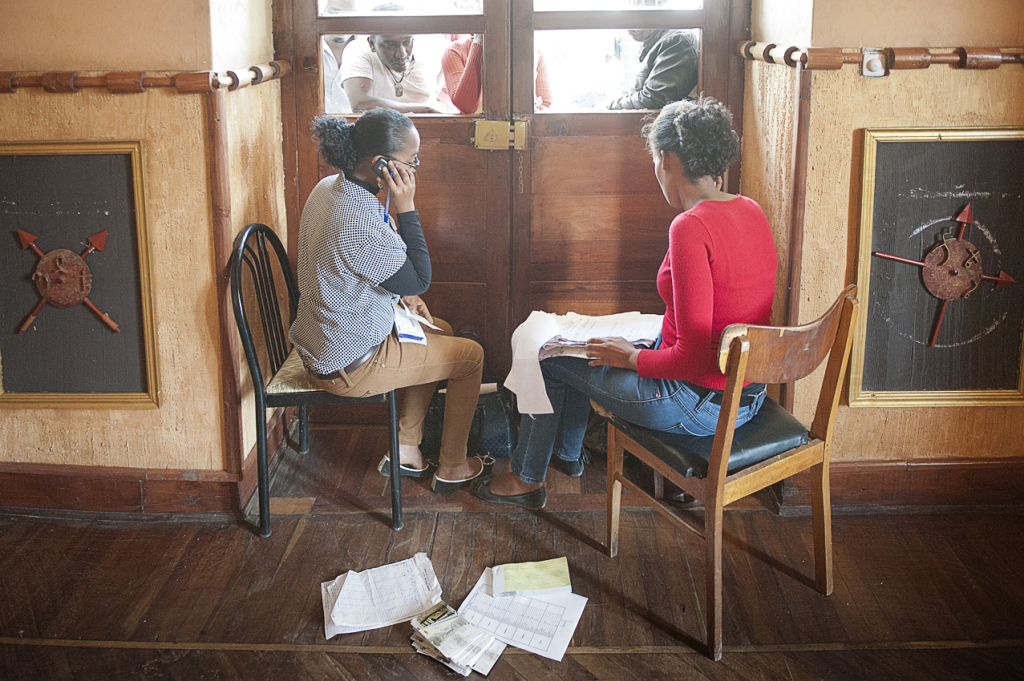 Per molti viaggiatori come me, l’albergo è stato casa e famiglia lontano da casa e famiglia. Il personale di servizio adotta spesso gli ospiti che si fermano a lungo nell’albergo e li copre d’attenzioni e d’affetto. Conosco persone che mentre erano ammalate sono state assistite dalle addette alle pulizie e dai camerieri con lo stesso amore che avrebbero potuto ricevere dalla propria madre. Per buona parte del personale dell’albergo, il Taitu non rappresenta solo il luogo di lavoro ma un posto dove vivere. L’incendio di domenica rischia di lasciarli a lungo senza lavoro. Persone che meritano sostegno e aiuto, come la ricostruzione di uno dei tempi laici più importanti di Addis Abeba merita l’attenzione e gli sforzi di tutti coloro che amano questa città.
Per molti viaggiatori come me, l’albergo è stato casa e famiglia lontano da casa e famiglia. Il personale di servizio adotta spesso gli ospiti che si fermano a lungo nell’albergo e li copre d’attenzioni e d’affetto. Conosco persone che mentre erano ammalate sono state assistite dalle addette alle pulizie e dai camerieri con lo stesso amore che avrebbero potuto ricevere dalla propria madre. Per buona parte del personale dell’albergo, il Taitu non rappresenta solo il luogo di lavoro ma un posto dove vivere. L’incendio di domenica rischia di lasciarli a lungo senza lavoro. Persone che meritano sostegno e aiuto, come la ricostruzione di uno dei tempi laici più importanti di Addis Abeba merita l’attenzione e gli sforzi di tutti coloro che amano questa città.
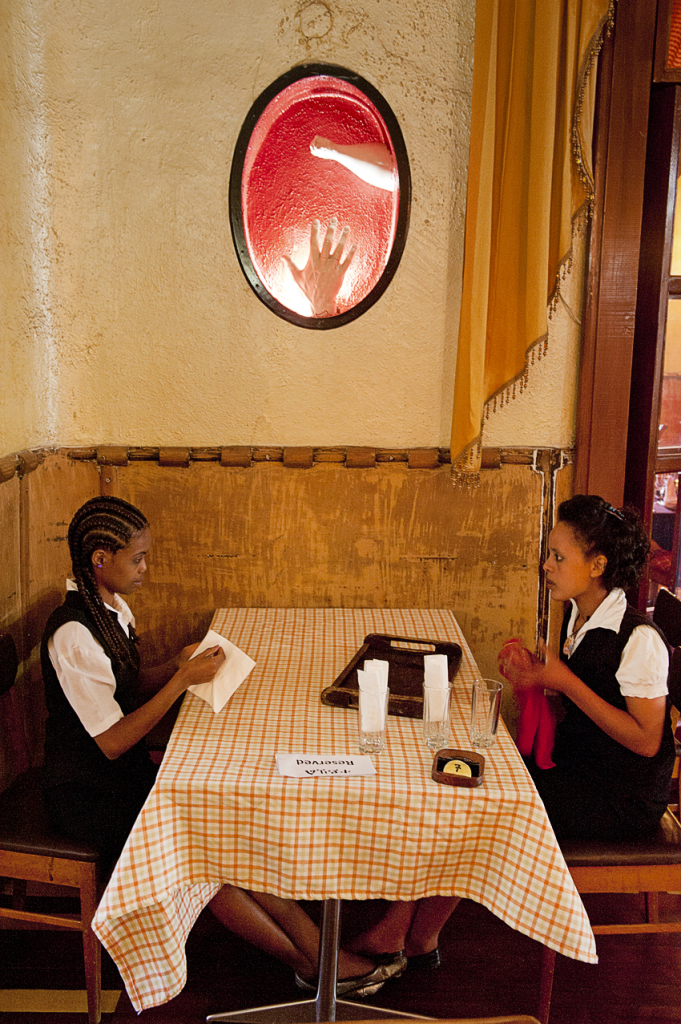 Luoghi come il Taitu sono importanti per il futuro di Addis quanto il treno leggero che sta per essere inaugurato. L’entusiasmo con cui gli abebini guardano alla modernità che avanza dovrebbe essere lo stesso con cui hanno cura della storia della loro città. Difendere il più antico albergo d’Etiopia, pretendere che il governo partecipi con il massimo impegno all’opera di pronta e fedele ricostruzione dell’edifico, significa assicurasi che nel petto della “nuova New York d’Africa” il cuore della città vecchia continui a batter forte. Quanto accadrà nei prossimi mesi a quello che la Lonely Planet definisce “un pezzo da museo arredato da un’immensa bellezza” sarà un banco di prova decisivo per capire se oltre a mettere in piedi una skyline degna della capitale globale che Addis sta diventando sempre più in fretta, l’amministrazione cittadina è interessata anche alla tutela e alla fruibilità del patrimonio storico della città.
Luoghi come il Taitu sono importanti per il futuro di Addis quanto il treno leggero che sta per essere inaugurato. L’entusiasmo con cui gli abebini guardano alla modernità che avanza dovrebbe essere lo stesso con cui hanno cura della storia della loro città. Difendere il più antico albergo d’Etiopia, pretendere che il governo partecipi con il massimo impegno all’opera di pronta e fedele ricostruzione dell’edifico, significa assicurasi che nel petto della “nuova New York d’Africa” il cuore della città vecchia continui a batter forte. Quanto accadrà nei prossimi mesi a quello che la Lonely Planet definisce “un pezzo da museo arredato da un’immensa bellezza” sarà un banco di prova decisivo per capire se oltre a mettere in piedi una skyline degna della capitale globale che Addis sta diventando sempre più in fretta, l’amministrazione cittadina è interessata anche alla tutela e alla fruibilità del patrimonio storico della città.
